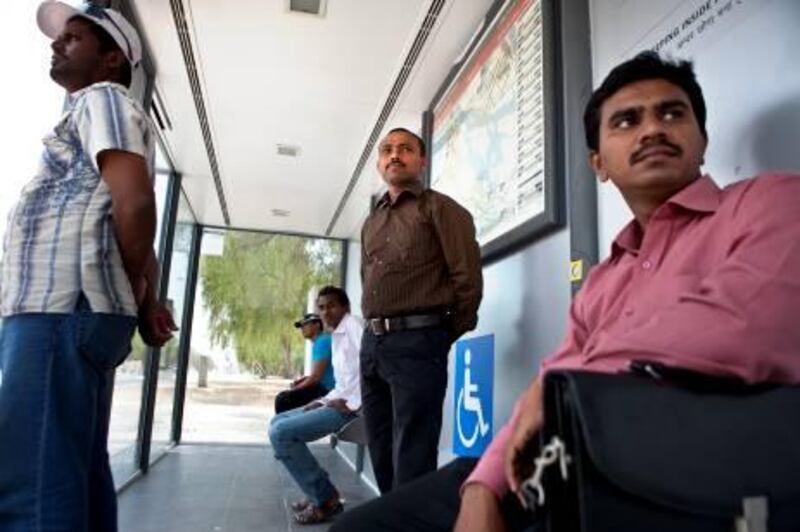ABU DHABI // To the capital's frustrated motorists it may seem ridiculous to suggest that parking woes and unpredictable driving may lead to improvement in inner-city traffic.
But residents say those problems, among others, are pushing them to choose public transport over private vehicles.
Alaa Mahmoud, 35, a Palestinian contracting executive based in Abu Dhabi, says he has a valid UAE licence and his own car.
But for Mr Mahmoud, taxis make more sense than fighting traffic and scrabbling for a parking space.
"I'm sick and tired of driving in the traffic," he says. "But more than anything, it's the parking. This is the root of the problem."
Mr Mahmoud, who lives on Airport Road near Al Wahda Mall and works on Khalifa Street, says he takes taxis about six times a day, spending nearly Dh300 a week on transport. His daily commutes include trips to and from work, as well as meetings.
"The best thing is a taxi," he says. "It's easily accessible and drops you right at the doorstep of your destination, instead of driving around for hours searching for a spot, parking far away and then walking in the heat."
The father of two says he sometimes takes taxis at the weekend when going out with his family.
"I won't drive unless it's an extreme emergency and even then I'll think twice, because a taxi could make me reach my destination faster," he says.
Mr Mahmoud is not alone. As temperatures rise into the 40s, the Moroccan Noora Ahmad stands at a shaded but not air-conditioned bus shelter on Airport Road.
"Driving is a waste of time and money," Ms Ahmad says. "Think about the amount of petrol you waste on the constant search for parking. Buses are less stressful and more cost efficient."
Rigorous law enforcement and high fines also make public transport more affordable, Ms Ahmad says.
"Fines from speeding, parking … all of these add up and rarely anyone can avoid them," she says.
Others also opt for public transport but for different reasons.
For Nezar Veleri, an assistant pharmacist from India, dangerous driving on the emirate's roads prevents him from getting behind the wheel.
Mr Veleri has been hesitant to take to the roads after being involved in a serious car accident in his home country. The driving behaviour in Abu Dhabi reaffirms his convictions, he says.
Mr Veleri takes the No 32 bus from the station near Airport Road and 29th Street to work every day.
He says he is generally satisfied with the bus service, although sometimes the wait can be long and tiresome, and air-conditioned bus shelters are not always reliable.
"Last week the air conditioning was broken in the shelter and I had to wait almost 20 minutes in the sun," Mr Veleri says.
Ms Ahmad says she recently had the same experience at a bus shelter near her home on Muroor Road.
"It was so hot in the shelter that it felt better to wait outside," she says. "But it was fixed two days later. They usually fix them immediately."
A recent statement from the Department of Transport (DoT) said that during the first phase of introducing the air-conditioned bus shelters, the design and the efficiency of the cooling system had been improved.
There are 81 air-conditioned shelters on Airport Road, Muroor Road, 6th Street, Al Falah Street and 24th Street, while work on another 380 shelters started at the beginning of this year.
The DoT also plans to more than double its fleet of buses from 600 to 1,360 by 2013, with plans of running 123 routes in the emirate by this December, up from 75 at the end of last year.
Long-term plans include ensuring bus stops are no more than 300 metres apart.
The expansion of the public bus network is part of the DoT's efforts to accommodate a growing population, which is expected to triple in the emirate by 2030.
Mr Mahmoud says although he does not consider buses appealing, increasing costs for fuel and private vehicle ownership may push more commuters into buses.
"People here are spoiled. They're all used to having their private space," he says. "They should make it harder for people to get a car.
"Loans here are given out too easily. If the transport authorities make it difficult to buy a car, then more people would consider public transport as a viable alternative."






